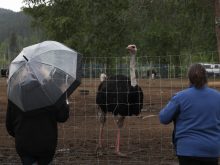London | Reuters — Bird flu has been detected in a sheep in northern England, the first known case of its kind in the world, Britain’s government said, adding to the growing list of mammals infected by the disease and fuelling fears of a pandemic.
Why it matters: While Canadian poultry farmers have been plagued by bird flu, transmission to other types of animals increases the risk of the disease becoming more widespread
Many different mammals have died of the H5N1 bird flu virus across the globe including bears, cats, dairy cows, dogs, dolphins, seals and tigers.
Read Also

JBS profit falls amid still-challenging US market environment
JBS, the world’s largest meat company, reported a net profit fall in the third quarter in spite of a rise in global net sales amid a still-challenging beef market environment in the U.S., according to an earnings statement on Thursday.
“The case was identified following routine surveillance of farmed livestock on a premises in Yorkshire where highly pathogenic avian influenza (H5N1) had been confirmed in other captive birds,” Britain’s government said in a statement.
There have been cases among humans which have ranged in severity from no symptoms to, in rare cases, death. But there has not yet been any confirmed transmission between humans.
The sheep that tested positive was a ewe with signs of mastitis, an inflammation of mammary tissue, and no other clinical signs, the statement from the British government’s Department for Environment, Food and Rural Affairs, and the Animal and Plant Health Agency said.
Ed Hutchinson, professor of molecular and cellular virology, MRC-University of Glasgow Centre for Virus Research, said the fact that the sheep’s milk also tested positive suggested parallels with the ongoing H5N1 outbreak among dairy cows in the United States.
Bird flu has spread among U.S. dairy cattle since March 2024.
He added, however, at the moment there was no evidence of ongoing transmission from the sheep and the case appeared to have been contained.
The ewe was culled and no further infection was found in the rest of the flock.
Britain’s rural affairs ministry has introduced surveillance of livestock on premises where bird flu has been confirmed in captive birds following the outbreaks among dairy cows in the United States.
“Globally, we continue to see that mammals can be infected with avian influenza (H5N1),” Dr Meera Chand, emerging infection lead at the UK Health Security Agency, said.
“However, current evidence suggests that the avian influenza viruses we’re seeing circulating around the world do not spread easily to people – and the risk of avian flu to the general public remains very low.”
— Reporting by Nigel Hunt and Sarah Young











